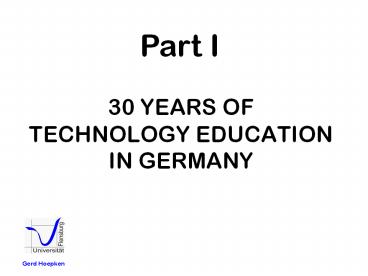30 YEARS OF TECHNOLOGY EDUCATION IN GERMANY - PowerPoint PPT Presentation
1 / 47
Title: 30 YEARS OF TECHNOLOGY EDUCATION IN GERMANY
1
30 YEARS OFTECHNOLOGY EDUCATIONIN GERMANY
Part I
Gerd Hoepken
2
1890
Gerd Hoepken
3
1920
1955
Gerd Hoepken
4
1967
Gerd Hoepken
5
1969
Gerd Hoepken
6
approaches of technology education (1970s)
Gerd Hoepken
7
- course of instruction
Teaching Methods
Gerd Hoepken
8
- course of instruction
- design activity
Teaching Methods
Gerd Hoepken
9
- course of instruction
- design activity
- making activity
Teaching Methods
Gerd Hoepken
10
- course of instruction
- design activity
- making activity
- technological experiment
Teaching Methods
Gerd Hoepken
11
- course of instruction
- design activity
- making activity
- technological experiment
- technological analysis
Teaching Methods
Gerd Hoepken
12
- course of instruction
- design activity
- making activity
- technological experiment
- technological analysis
- technological exploration
Teaching Methods
Gerd Hoepken
13
- course of instruction
- design activity
- making activity
- technological experiment
- technological analysis
- technological exploration
- technological assessment
Teaching Methods
Gerd Hoepken
14
- course of instruction
- design activity
- making activity
- technological experiment
- technological analysis
- technological exploration
- technological assessment
- project
Teaching Methods
Gerd Hoepken
15
- course of instruction
- design activity
- making activity
- technological experiment
- technological analysis
- technological exploration
- technological assessment
- project
- case study
Teaching Methods
Gerd Hoepken
16
- course of instruction
- design activity
- making activity
- technological experiment
- technological analysis
- technological exploration
- technological assessment
- project
- case study
- expert inquiry
Teaching Methods
Gerd Hoepken
17
methods of assigning and assessment anticipating
methods realizing methods simplifying/systema
tizing methods analyzing methods
Technological Methods
Gerd Hoepken
18
Primary School 1972
Gerd Hoepken
19
Primary School 1972
Gerd Hoepken
20
Primary School 1972
Gerd Hoepken
21
Lower Secondary School 1992
Gerd Hoepken
22
Lower Secondary School 1998
Gerd Hoepken
23
Lower Secondary School 1991
Gerd Hoepken
24
Lower Secondary School 2003
Gerd Hoepken
25
Gerd Hoepken
Gerd Hoepken
26
Gerd Hoepken
27
Part II A new Technology Curriculum for
Secondary Schools in Schleswig-Holstein As a
Part of a General Curricula Revision
28
(No Transcript)
29
(No Transcript)
30
(No Transcript)
31
1.
The new curricula should come to terms with
core problems
32
2.
The new curriculashould securea commonbasic
education
33
3.
The new curriculashould help to connect the
experiences of life
34
4.
The new curricula should strengthen cross
curricular co-operation
35
5.
The new curriculashould relieve teaching
36
6.
The new curricula should strengthen profile and
co-operation of school subject, school stages and
school branches
37
Core problem 1 Basic values of human living
together, especially peace, human rights and
living together in a world with different
cultures, social systems, peoples, and nations to
be an individual and global task. 1. Basic values
of human living together and their meaning for
school 2. Principles of education in regard of
peace 3. Peace as an aspect of subjects, the
example of sciences 4. Projects in peace
education 5. Over development or surviving 6.
Learning in a world being a part of "One World"
38
- Core problem 2
- Preservation of the natural fundamentals of life,
of personal and other peoples well being. - Ecological education - shaping the man-nature
relation as aguide line for pedagogy - 2. From subject lessons to cross curricular
ecological education - 3. The future task to ecological education as a
charge for all school subjects - 4. Learning in a healthy way is more than
learning health
39
Core problem 3 The future change in economic,
technological, and social conditions of life and
their impact on shaping conditions of life. 1.
Landmarks for curricula revision
Schleswig-Holstein 2. Records of working group 1
(economics) 3. Records of working group 2
(social) 4. Records of working group 3 (new
media)
40
Core problem 4 Equal status for women and men,
boys and girls within the family, vocation and
society. 1. Research outcomes relating to the
gender issue - consequences for lessons
and pre- and in-service training of
teachers 2. Records of the working group
"research outcomes relating to the gender
issue" 3. Language aspects of inequality and
equality of gender 4. Inequal conditions for
girls/women and boys/men in the areas of
science education and vocational orientation
41
Core problem 5 The right of all human beings to
organise their own political, cultural, and
economic conditions of life, their participation
and joint responsibility in all areas of life. 1.
Social change and participation in society,
economy, and politics 2. Intercultural
education - charge and chance 3. Intercultural
district schools - bilingual learning
42
Key capabilities - acquiring factual knowledge
about technology - acquiring ability to organise
production in craftsmans or industrial ways -
acquiring safe ways of acting - knowing
fundamentals of order at a working place and in
the workshop - using appropriate ways of working
with materials, tools, machines, and devices -
making objects in a precise way - acquiring
sensitivity towards sparing resources, using
energy, avoiding waste, and recycling -
preparing ability to use technology in safe and
appropriate ways - bringing creativity into the
solution of problems - acquiring technological
sensitivity and awareness of problems/learning
transferable strategies - acquiring ability
to comprehend complex connected situations -
acquiring ability to evaluate technology -
acquiring decision competence in the area of pre
vocational orientation - acquiring ability to
experience - acquiring independence - discovering
and perceiving own endowment - acquiring ability
to work in teams and to accept each other in
different situations
43
Fields of Action - Work and production -
Transportation and trafic - Supply and waste
management - Information and communication -
Construction and built environment
44
(No Transcript)
45
(No Transcript)
46
(No Transcript)
47
Thank You!
Gerd Hoepken






















![YMCA University of Science & Technology - [YMCA], Faridabad PowerPoint PPT Presentation](https://s3.amazonaws.com/images.powershow.com/9657058.th0.jpg?_=20210906034)








